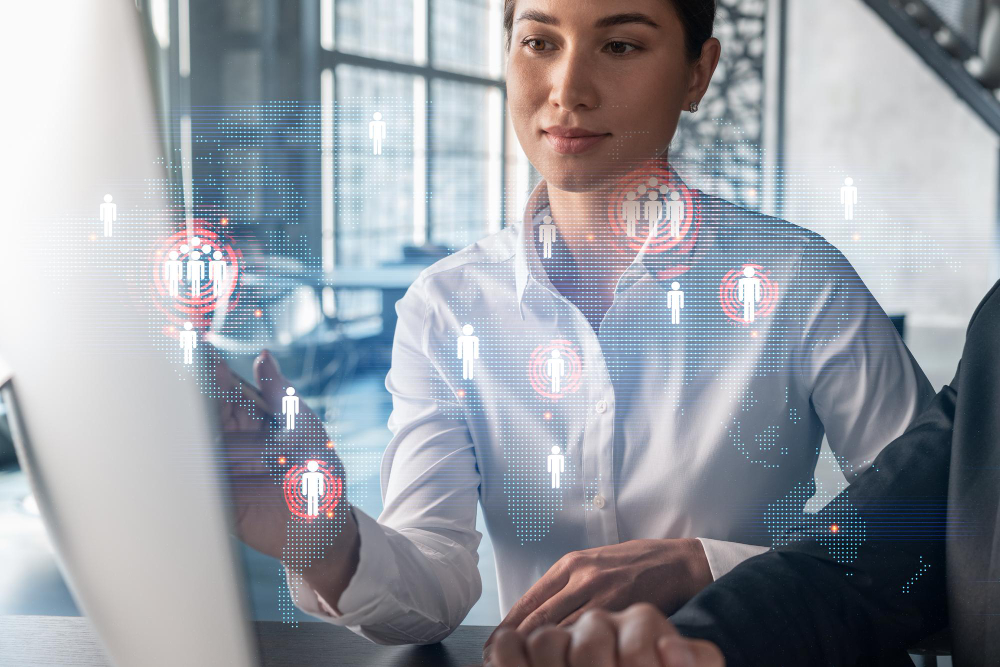Artificial Intelligence (AI) has emerged as a powerful force in the modern workplace, revolutionizing various sectors and transforming traditional workflows. Among the myriad applications, the integration of AI in Human Resources (HR) stands out as a prime example of how technology can enhance efficiency, decision-making, and employee experience. This blog will explore the key ways AI is reshaping HR and the broader workplace landscape.
Streamlining Recruitment Processes
One of the most significant impacts of AI in HR is the streamlining of recruitment processes. Traditionally, hiring has been a labor-intensive task, involving the review of numerous resumes, conducting interviews, and evaluating candidates. AI-powered recruitment tools can automate much of this process. For instance, AI algorithms can scan resumes for keywords, experience, and qualifications, shortlisting the best candidates in a fraction of the time it would take a human recruiter. Additionally, AI-driven chatbots can handle initial candidate interactions, answering common questions and scheduling interviews, thereby freeing up HR professionals to focus on more strategic tasks. HR Tech Conference is a pivotal event showcasing the latest advancements and innovations in human resources technology.
Enhancing Employee Onboarding
AI is also transforming the employee onboarding process. Onboarding can be a complex and time-consuming procedure, involving the dissemination of information about company policies, culture, and job-specific training. AI can simplify and personalize this experience. For example, AI-powered onboarding platforms can provide new hires with customized learning paths, track their progress, and offer interactive training modules. This not only ensures a more engaging onboarding experience but also helps new employees become productive more quickly.
Improving Employee Engagement and Retention
Maintaining high levels of employee engagement and retention is a critical challenge for HR departments. AI can play a pivotal role in addressing this issue. Through the use of AI-driven analytics, HR can gain insights into employee sentiment, identify potential areas of dissatisfaction, and take proactive measures to improve workplace morale. For instance, AI can analyze data from employee surveys, social media, and communication platforms to detect patterns and trends that might indicate disengagement. Moreover, AI-powered tools can personalize employee experiences by suggesting career development opportunities, training programs, and even wellness activities tailored to individual preferences and needs.
Optimizing Performance Management
Performance management is undergoing a profound transformation with the integration of AI. Traditional performance reviews are frequently marred by biases and inconsistencies, which can result in employee dissatisfaction and reduced engagement. AI offers a solution by delivering objective, data-driven insights into employee performance. AI-powered performance management systems excel at tracking key performance indicators (KPIs), monitoring progress in real-time, and offering continuous feedback. This approach promotes a transparent and equitable evaluation process, ultimately boosting employee motivation and productivity.
Facilitating Data-Driven Decision Making
The integration of AI in HR also facilitates data-driven decision-making. HR departments are often required to make strategic decisions based on vast amounts of data, from employee performance metrics to market trends. AI-powered analytics tools can process and analyze this data quickly and accurately, providing HR professionals with actionable insights. This enables more informed decision-making, whether it’s about hiring strategies, workforce planning, or employee development programs.
Ensuring Compliance and Reducing Bias
AI can also help ensure compliance with legal and regulatory requirements in HR processes. For instance, AI-powered systems can monitor and ensure that recruitment and hiring practices comply with anti-discrimination laws, reducing the risk of bias. Additionally, AI can help track and manage compliance with workplace safety regulations, labor laws, and other relevant standards.
Conclusion
The integration of AI in HR and the broader workplace is not just a trend but a transformative shift that is redefining how organizations operate. By streamlining recruitment, enhancing onboarding, improving employee engagement, optimizing performance management, facilitating data-driven decision-making, and ensuring compliance, AI is empowering HR professionals to focus on strategic initiatives that drive business success. As AI technology continues to evolve, its impact on the workplace will only grow, ushering in a new era of efficiency and innovation.


